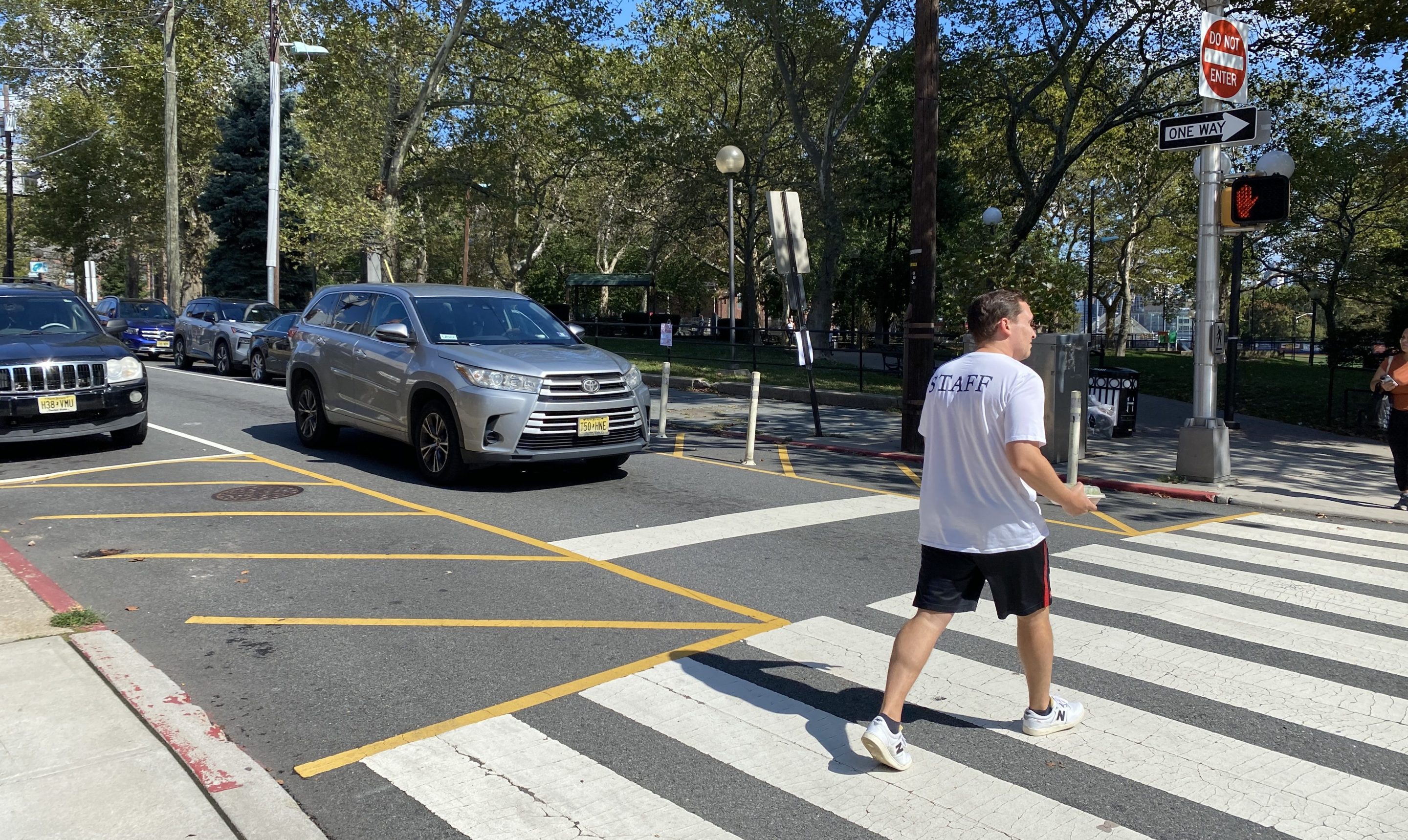Council Speaker Adrienne Adams and the Adams administration are colluding to kill a long-awaited bill to ban parking near all intersections for better visibility — a dramatic, lame-duck gambit that street safety advocates blasted as an egregious form of political gamesmanship.
The top city lawmaker is backing a Department of Transportation revision of a popular bill, thereby preserving the status quo that allows drivers to park at street corners, directly next to crosswalks, preventing pedestrians and drivers from seeing each other.
The backtracking also narrows the size of school zones, where drivers must obey stricter traffic laws. It’s a major setback for a years-long grass-roots campaign inspired by the preventable deaths of several children, who need better sight lines more than anyone else.
"Stop playing political games with children's lives," said Elizabeth Adams, deputy director of Transportation Alternatives. "We’re disappointed and angry that the City Council is working to water-down a critical, lifesaving bill."
The maneuver targets Council Member Julie Won's universal daylighting bill, Intro 1138, which would prohibit parking within 20 feet of all city intersections, and would require DOT to add hard infrastructure at 1,000 intersections a year to keep illegal parkers out. (Parking near corners is already banned under state law, but the city is allowed to exempt itself.)
DOT officials recently sent the Council a counter-proposal: the agency would daylight 100 locations a year — with no hardening requirement at all. The changes duplicate legislation from 2023, yet Speaker Adams has embraced it, even though the changes are far below what lawmakers hoped to negotiate for.
A new addition also defines "high priority intersections" as those that fall within a 660-feet radius of a school, or one-eighth of a mile. That's half the state's legal description of a school zone, which is one-quarter of a mile. This seemingly minor change alarmed street safety advocates, who said it would set a bad precedent for other measures restricted to those areas, like speed and red-light cameras.
"Narrowing priority intersections has implications that go beyond this issue — it can reduce other traffic calming measures around schools like speed cameras," said Jackson Chabot, director of advocacy and organizing at Open Plans, which shares a parent company with Streetsblog. "We urge the Council to do whatever it takes to make the streets easier and safer for New Yorkers to traverse — not less."
The closed-door switcheroo, first reported by Hell Gate, comes after nearly a year of opposition from the Department of Transportation.
Speaker Adams worked against Won’s pending bill in spite of its support from a majority of the 51-member Council, including the Transportation Committee chair and lawmakers from car-friendly areas like Staten Island's south shore.
In recent weeks, Won has eyed amendments to assemble the two-thirds majority she needs to overcome an all-but-assured veto by Mayor Adams. Those amendments initially included restricting universal daylighting to areas near schools and other locations like parks, while only covering corners where vehicles approach in the rest of the city. These changes would daylight three-quarters of city intersections.
DOT's revisions also aim lower than Mayor Adams's vow to daylight 1,000 intersections a year. The outgoing mayor issued that promise after an NYPD tow truck driver killed a 7-year-old child at an intersection with blocked visibility in 2023. DOT watered-down that promise in its first year already to just covering 1,000 locations, which can be as little as one side of one corner per junction.
One organizer felt like the effort was at a "dead end" with both Adamses, and proposed waiting until the administration of mayor-elect Zohran Mamdani, who has pledged to implement universal daylighting. Two frontrunners of the race for Council speaker, Crystal Hudson and Julie Menin, have also signed onto Won’s bill.
"We’re at a dead end here with this Speaker, and unfortunately we’re probably going to have to wait until next year when we have a new Council and a new Speaker," said Alex Duncan, who also goes by Miser, an Astoria resident who founded the popular subreddit r/MicromobilityNYC, which boosted daylighting early on.
As Won's bill gained support early this year, DOT launched an all-out war against the policy. The agency claimed that universal daylighting, which has brought safety benefits from Hong Kong to Hoboken, would drastically increase injuries and repurpose hundreds of thousands of car storage spots.
DOT published a controversial study that argued daylighting without hard infrastructure would actually increase injuries by 15,000 per year. DOT officials even persuaded an original supporter of the bill, Council Member Gale Brewer of the Upper West Side, to cancel her endorsement, by telling her the legislation would remove 13,000 parking spaces in one district.
The agency has admitted that its own review came with major caveats, and the Council's data team ran a review of the data and rebutted a central part of the city’s argument, noting that they couldn't find evidence for increased dangers from daylighting and accusing DOT officials of skewing their data, according to documents obtained by Streetsblog. The Council has so far declined to release its report publicly.

Speaker Adams's resistance to common-sense parking policy caps a record of undermining progressive transportation policy. She decimated outdoor dining, elevated anti-bike Republicans, refused to lower the citywide speed limit to 20 miles per hour after the state granted the city that power with Sammy's Law, failed to make Mayor Adams follow the Streets Master Plan, and watered down the city's plan to eliminate mandatory parking minimums.
There are only two more full Council meetings before the end of the year, and advocates worry that Speaker Adams might wait to bring the watered-down bill to a vote at the final so-called Stated Meeting, precluding any further amendments.
Neither DOT nor Speaker Adams's office would comment on the new revisions; spokespeople merely sent over statements they provided for previous stories.






